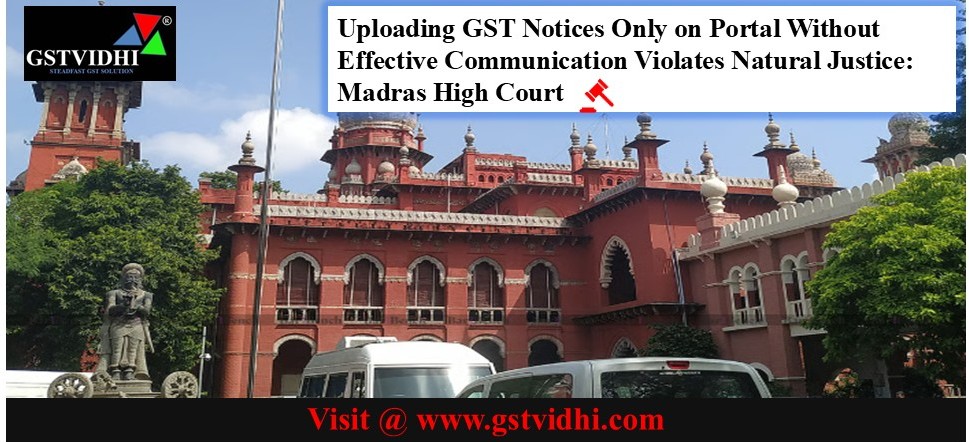
Uploading GST Notices Only on Portal Without Effective
Communication Violates Natural Justice: Madras High Court
Introduction:
In a landmark decision
reiterating the importance of effective service of GST notices, the Madras
High Court quashed a demand order issued under Section 73 of the
CGST/TNGST Act against M/s Sri Murugan Agro Service, holding that mere
portal upload of notices without ensuring actual receipt or personal hearing
violates principles of natural justice.
The Court further
directed the GST officer to remand the matter afresh, provided the
taxpayer deposits 25% of the disputed tax amount, and emphasized the
need for exploring alternate communication modes under Section 169 of
the GST Act when a taxpayer fails to respond.
Case Overview
- Case Title:
M/s Sri Murugan Agro Service v. State Tax Officer, Gingee Assessment
Circle
- Writ Petition No.:
23587 of 2025
- Court:
High Court of Madras
- Date of Order:
1 July 2025
Factual
Background
- The petitioner, M/s Sri Murugan
Agro Service, challenged the order dated 01.02.2025 passed by
the State Tax Officer under Section 73 for FY 2020–2021.
- The petitioner submitted that notices
and communications were uploaded only on the GST portal, and due to lack
of awareness, no reply was filed.
- Further, the department passed the final
assessment order ex parte, without granting a personal hearing
or adopting any alternate mode of notice service
Legal
Issues
1. Whether
uploading notices only on the GST portal, without ensuring actual
receipt or following alternate communication methods, constitutes valid service
under GST law?
2. Whether
absence of a personal hearing before passing the order violates the principles
of natural justice under Section 75?
Petitioner's
Submissions
- The petitioner contended that they
were unaware of notices uploaded online and received no physical
copy.
- The impugned order was passed ex
parte, without granting a personal hearing, violating the mandatory
safeguards under GST law.
- The petitioner voluntarily offered
to pay 25% of the disputed tax amount to facilitate rehearing and
reconsideration.
Department’s
Stand
- The Government Advocate acknowledged
that notices were only uploaded on the portal.
- She also conceded that no personal
hearing was granted before passing the final order.
- The department did not oppose the
remand, subject to deposit of 25% of the disputed tax.
Court’s
Observations
Justice Krishnan Ramasamy
made several critical observations:
🔸 On Service of Notice:
“No doubt, uploading on
portal is a form of service, but if there is no response, the officer should
have explored alternate modes prescribed in Section 169, such as RPAD
or personal delivery.”
🔸 On Personal Hearing:
“The impugned order was
passed without affording personal hearing, which is a vital safeguard
under the Act.”
🔸 On Legal Procedure:
“Passing ex parte orders
by merely fulfilling formality through online upload serves no useful purpose
and leads to multiplicity of litigation.”
Final
Judgment
The Court set aside the
impugned assessment order dated 01.02.2025 with the following
directions:
Key Reliefs:
1. The
petitioner must pay 25% of the disputed tax within 4 weeks.
2. The
impugned order stands quashed upon such payment.
3. Petitioner
to file detailed reply and documents within 3 weeks after payment.
4. The
Assessing Officer to issue a 14-day clear personal hearing notice,
followed by a fresh, reasoned order in accordance with law.
Conclusion:
The judgment in Sri
Murugan Agro Service is a firm reminder to GST officers that procedural
shortcuts cannot replace substantive justice. It also serves as guidance
for taxpayers to remain vigilant about portal communications while
ensuring that officers follow prescribed methods when seeking responses.
This case strengthens the
jurisprudence on natural justice, fair hearing, and proper
service of notices in GST matters.
Disclaimer: All the Information is based on the notification, circular advisory and order issued by the Govt. authority and judgement delivered by the court or the authority information is strictly for educational purposes and on the basis of our best understanding of laws & not binding on anyone.
Find the Attachment (Press on Click Here )
Click here